人教版高中必修二Unit3 Computers words and expressions PPT教学课件
高中英语人教版必修2课件:Unit 3 Computers
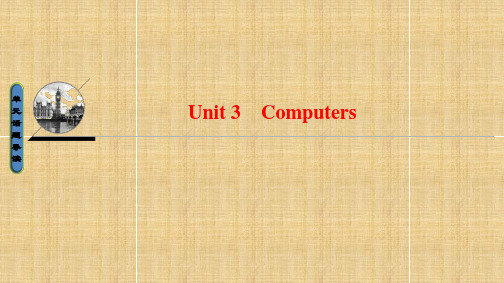
Well, in general, WWW stand for “World Wide Web”. Most people confuse the Internet with the World Wide Web. However, there is a difference. The Internet is made up of thousands of computers that are connected worldwide. WWW or World Wide Web, is what your computer uses to check out the Internet. For example, your computer uses browsers, such as Internet Explorer or Netscape (网景浏览器) to let you see and hear all the cool pictures, information, music and sounds on the Internet.
1.confuse vt. 2.connect vt. 3.browser n. 4.surf vt. 5.modem n. 6.graphics n.
使混乱;使困惑 连接;联合;关联 (电脑)浏览器 在……上冲浪 调制解调器 绘画;图像
1.What difference is there between the Internet and WWW? ________________________________________________________________ 2.What do you need if you surf the World Wide Web? ________________________________________________________________ 【答案】 1.The Internet is made up of thousands of computers that are connected worldwide;WWW is what your computer uses to check out the Internet. 2.You need to have a computer with a modem and a browser.Besides,you need to have an Internet Service Provider.
人教高中英语必修二:Unit+3+Computers+教学设计.doc
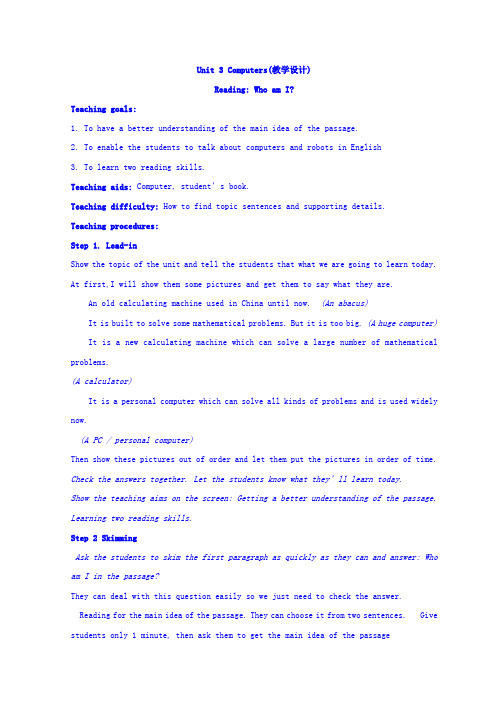
Unit 3 Computers(教学设计)Reading: Who am I?Teaching goals:1. To have a better understanding of the main idea of the passage.2. To enable the students to talk about computers and robots in English3. To learn two reading skills.Teaching aids: Computer, student’s book.Teaching difficulty: How to find topic sentences and supporting details.Teaching procedures:Step 1. Lead-inShow the topic of the unit and tell the students that what we are going to learn today. At first,I will show them some pictures and get them to say what they are.An old calculating machine used in China until now. (An abacus)It is built to solve some mathematical problems. But it is too big. (A huge computer) It is a new calculating machine which can solve a large number of mathematical problems.(A calculator)It is a personal computer which can solve all kinds of problems and is used widely now.(A PC / personal computer)Then show these pictures out of order and let them put the pictures in order of time. Check the answers together. Let the students know what they’ll learn today.Show the teaching aims on the screen: Getting a better understanding of the passage. Learning two reading skills.Step 2 SkimmingAsk the students to skim the first paragraph as quickly as they can and answer: Who am I in the passage?They can deal with this question easily so we just need to check the answer.Reading for the main idea of the passage. They can choose it from two sentences. Give students only 1 minute, then ask them to get the main idea of the passageStep 3 Reading for specific information.At the beginning, explain to the students what topic sentence and supporting details mean. Students can read the explanation on the screen by themselves.As the passage is a bit difficult, I’ll lead the students to find out the topic sentence and supporting details of paragraph 1. Add explanations where necessary.Next, the students should be able to find out the topic sentences and supporting details of paragraphs 2 and 3. Give them several minutes.After finishing the tasks, make a simple summary.As we talk about the development of something, time is very important for us to understand better. Now let’s complete the timeline on page 19. Give them three minutes to finish it individually.A chain of events showing the development of computer / Changes of the machineTimeline1642: ____________________________________________:: the Analytical Machine was made by Charles Babbage.1936: _______________________________________________________________________1960s: ________________________ ______________________________________________: the first family of computers was connected to each other.1970s: ______________________________________________________________________Now: _______________________________________________________________________In order to help the students get a better understanding, I’ll show them a short video about the development of computers.Step 4 Post-readingNow we know the development of computers(show the pictures in the right order). Can you guess What’s Next?Give students 2 minutes to talk with parters about What will robots do for us in the future?Then ask some students to share their opinions with us.Summarize like this: Robots are useful in our daily life. For example, it can help us cook, clean the room, wash clothes and accompany us . Also, they can direct the traffic,carry out operations and even do some dangerous jobs.Blow the short summary, I’ll show them two sentences and they are supposed to decide which one is the topic sentence:A.Robots can do a lot of things for us.B.Robots have changed a lot.Step 5 SummaryToday we have learnt:1). the development of computers2) how to find topic sentences and supporting details.Encourage the students to use the reading skills in study.Step 6 Homework1. Read the text aloud and try to retell it in order of time.2. Read the passage again. Underline the sentences that you don’t understand and try to solve the problems using context clues and the dictionary.精美句子1、善思则能“从无字句处读书”。
人教高中英语必修二:Unit+3+Computers+教学设计.doc

Unit 3 Computers(教学设计)Reading: Who am I?Teaching goals:1. To have a better understanding of the main idea of the passage.2. To enable the students to talk about computers and robots in English3. To learn two reading skills.Teaching aids: Computer, student’s book.Teaching difficulty: How to find topic sentences and supporting details.Teaching procedures:Step 1. Lead-inShow the topic of the unit and tell the students that what we are going to learn today. At first,I will show them some pictures and get them to say what they are.An old calculating machine used in China until now. (An abacus)It is built to solve some mathematical problems. But it is too big. (A huge computer) It is a new calculating machine which can solve a large number of mathematical problems.(A calculator)It is a personal computer which can solve all kinds of problems and is used widely now.(A PC / personal computer)Then show these pictures out of order and let them put the pictures in order of time. Check the answers together. Let the students know what they’ll learn today.Show the teaching aims on the screen: Getting a better understanding of the passage. Learning two reading skills.Step 2 SkimmingAsk the students to skim the first paragraph as quickly as they can and answer: Who am I in the passage?They can deal with this question easily so we just need to check the answer.Reading for the main idea of the passage. They can choose it from two sentences. Give students only 1 minute, then ask them to get the main idea of the passageStep 3 Reading for specific information.At the beginning, explain to the students what topic sentence and supporting details mean. Students can read the explanation on the screen by themselves.As the passage is a bit difficult, I’ll lead the students to find out the topic sentence and supporting details of paragraph 1. Add explanations where necessary.Next, the students should be able to find out the topic sentences and supporting details of paragraphs 2 and 3. Give them several minutes.After finishing the tasks, make a simple summary.As we talk about the development of something, time is very important for us to understand better. Now let’s complete the timeline on page 19. Give them three minutes to finish it individually.A chain of events showing the development of computer / Changes of the machineTimeline1642: ____________________________________________:: the Analytical Machine was made by Charles Babbage.1936: _______________________________________________________________________1960s: ________________________ ______________________________________________: the first family of computers was connected to each other.1970s: ______________________________________________________________________Now: _______________________________________________________________________In order to help the students get a better understanding, I’ll show them a short video about the development of computers.Step 4 Post-readingNow we know the development of computers(show the pictures in the right order). Can you guess What’s Next?Give students 2 minutes to talk with parters about What will robots do for us in the future?Then ask some students to share their opinions with us.Summarize like this: Robots are useful in our daily life. For example, it can help us cook, clean the room, wash clothes and accompany us . Also, they can direct the traffic,carry out operations and even do some dangerous jobs.Blow the short summary, I’ll show them two sentences and they are supposed to decide which one is the topic sentence:A.Robots can do a lot of things for us.B.Robots have changed a lot.Step 5 SummaryToday we have learnt:1). the development of computers2) how to find topic sentences and supporting details.Encourage the students to use the reading skills in study.Step 6 Homework1. Read the text aloud and try to retell it in order of time.2. Read the passage again. Underline the sentences that you don’t understand and try to solve the problems using context clues and the dictionary.品味人生1、不管鸟的翅膀多么完美,如果不凭借空气,鸟就永远飞不到高空。
新人教版高中英语必修二《Unit 3 Computers》精品
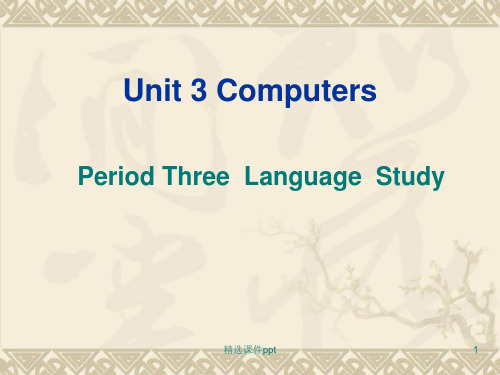
精选课件ppt
9
电脑帮助我
们解决很多 任务,这些 任务我们往 往在短时间 内难以解决。
solve
Computers help us solve many tasks,
which are difficult to complete in a short time.
精选课件ppt
10
explore
即便如此,
1)so +adj/adv +that从句。 2) so +adj+ a(n)+单数可数名词+that从句。 3)so+ many/much/few/little +名词+that从句。 Such…that表示“如此…以至于”引导结果状语
从句。
1)such +adj +复数可数名词+that从句。
2) such+adj+不可数名精选词课件+pptt hat从句。
❖ 1.as a result of 2.in a way 3.with the help of
4.deal with 5. watch over
精选课件ppt
2
Fill in the blanks
As technology develops, computers play an
important role both in our life and work. They
此课件下载可自行编辑修改,供参考! 感谢您的支持,我们努力做得更好!
Personally, students should use computers
properly so as to succeed in study.
人教版高中必修二Unit3 Computers words and expressions (共41张PPT)

logical [ˈlɒdʒɪkl]
adj. 必然的;合乎情理的;合乎常理的; 符合逻辑的;按照逻辑的 派生词: logically adv. logic 逻辑(学)+ al …的 → 符合逻 辑的
technology [tekˈnɒlədʒi]
n. 科技;工艺;工程技术 复数: technologies 派生词: technological adj.
explore一般指对未知事物或新生事物的探 索、观察与研究;
We must explore all the possibilities. He likes to explore the cave. One day, they explore a forest together.
goal [ɡəʊl]
adj. 个人的;私人的;人际的;个性的;私
事的
记忆技巧:person 人 +
al …的→ 个人的
personally adv. 就个人而言;亲自
tube n.管子 transistor n.晶体管 chip n.芯片
as a result 结果
He worked hard at his study.As a result, he passed the exam easily.
Alan Turing
solve [sɒlv]
v. 解决;处理;解答;破解 ability to solve something 解决某事的能力 solve a crisis 化解危机 solve a mystery 破解迷局 solve a problem 解决问题 solve a puzzle 解答谜题 way to solve something 解决某事的方法
人教版高中英语必修二unit3Computers

way to help him keep track3 of things he couldn’t remember.He
invented a software4 program that allowed him to create a document
that had links to other documents.He continued to develop his idea
万维网的出现彻底改变了世界,创造了大量的财富并从根 本上改变了人们的生活方式。而它的创始人英国计算机科学家 蒂姆·伯纳斯·李对于自己这一成果的现状并不满意。一起去了解 一下这位“万维网之父”吧!
Most people have never heard of Tim Berners-Lee.He is not nearly as rich or famous as Marc Andreessen,who is the founder of Netscape,or Bill Gates,whose name has become a well-known word.
识 点 reality n.真实;事实;现实totally adv.完全地;整个地
目 单 application n.应用;用途;申请network n.网络;网状物
标 词 mobile adj.可移动的;机动的finance n.金融;财经
explore vt.&vi.探索;探测;探究anyhow adv.(也作anyway)
知 重点 识 句型 目 标
易错 难点 语法
Computers
so...that...如此……以至于……
from...on从……时起
deal with处理;安排;对付as a result结果
人教版高中英语必修二 unit 3 computers languge points

1. As time went by, I was made smaller. 在本句中, as用作连词,引导时间状语从句,表示“随着 …”,
Eg:
⑴随As着t时im间e 的we流n逝t b,y 他们变成了好朋友。
______________, they became close friends. ⑵随A着s h他e长gr大ew,u他p对一切都失去了兴趣。
over time 随着时间的推移 have been changed
现在完成时的被动语态
calculate
Vt 计算 n calculator 计算机
…I could simplify difficult sums.
simlify 动词,简化,使。。。简单化 simple adj 简单的 sum n.计算,总数 如果你简化问题,这个问题就变简单了
Languge points
New words and expressions
1.计算机器
calculating machine
2.分析机
analytical machine
3.穿孔卡
card with holes
4.技术革命
technological revolution
5.通用机器
universal machine
。
….and it took nearly two hundred years before I was built as an analytical machine
by Charles Babbage.
before 过多久才……
It took me nearly one year before I
This child is lively as well as healthy. 连接两个谓语时,时态应保持一致 eg,他亲手建造并装修了这间房屋。
人教版高中英语必修2Unit 3 Computers语言点总结
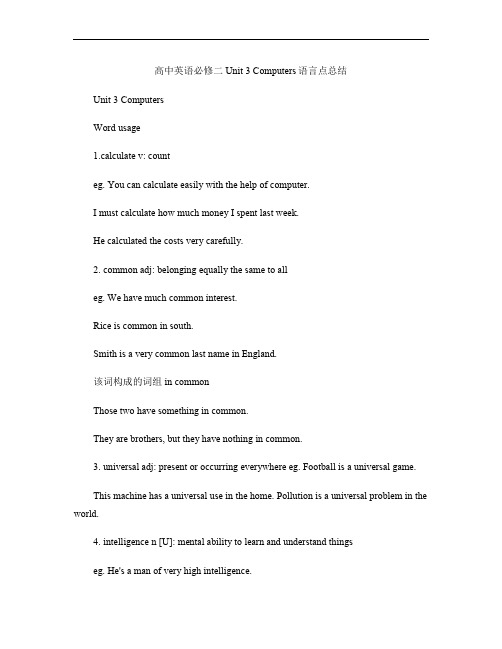
高中英语必修二Unit 3 Computers语言点总结Unit 3 ComputersWord usage1.calculate v: counteg. You can calculate easily with the help of computer.I must calculate how much money I spent last week.He calculated the costs very carefully.2. common adj: belonging equally the same to alleg. We have much common interest.Rice is common in south.Smith is a very common last name in England.该词构成的词组in commonThose two have something in common.They are brothers, but they have nothing in common.3. universal adj: present or occurring everywhere eg. Football is a universal game.This machine has a universal use in the home. Pollution is a universal problem in the world.4. intelligence n [U]: mental ability to learn and understand thingseg. He's a man of very high intelligence.It requires a high degree of intelligence to do the job well.When the water pipe burst, she had the intelligence to turn off the water at the main.5. anyway adv: anyhoweg. I can’t understand it anyway.Do the job anyway you like.It may rain, but we shall go anyway.6. totally adv: completelyeg. I am afraid I totally forgot it.I totally agree with you.He misunderstood me totally.7. advantage n: favorable factorseg. The job has many advantages.He had the advantage of a good education.What is the advantage of using this machine?该词的反义词为disadvantageeg. His lack of education was a disadvantage when he looked for a job.Not studying will be to your disadvantage.8. disagree vi: be unlike or have a different opinion eg. Our answers to the problem disagreed.We disagreed about everything.We disagreed on which movie to see.9. choice n: the act of choosingeg. We each had to make a choice.I will go with him because I have no choice.The shop has a wide choice of hats.10. material n: matter from which things are madeeg. Wood and stone are the only raw materials on the island. The teaching material in the school is advanced.Your writing materials are there.11.create v: to cause to be or existeg. An artist should create beautiful things.How was the universe created?That would create a wrong impression.12. arise (arose, arisen vi: come into beingeg. A question arose in the meeting.Disagreements arose between them.Unexpected difficulties arose in the course of their experiment.13. personally adv :ain person or not represented by otherseg. He went there personally.The plan was granted personally by our boss.b as a personeg I don’t know him personally, but I have read his book.. Personally, I don't approve of her.I dislike him personally, but I admire his art.14. technology: the art application in industry, etc or the study of mechanical arts and applied sciences.Eg. With the help of modern technology, you can do many things in a short time.People today enjoy a high level of technology.Useful expressions1. in one’s opinion: it is one’s view or feelingeg. In my opinion, the project is worth.In his opinion, the writing is excellent.In my opinion, the money is not enough.2. go by: passeg. As time goes by my memory seems to get worse. This week went by slowly.Don’t let the opportunity go by.3.so…that…: with the aim thateg. We were so tired that we did nothing that evening. The word was so small that I could hardly see it.He was so excited that he couldn’t speak.4. in a way: to a certain extent but not entirelyeg. The changes are an improvement in a way.The work is well done in a way.5. after all: in spite of what has been said, done or expected. eg. So you have come after all.After all, what does it matter?I’m sorry. I can’t come after all.6. with the help ofeg. I finished the job on time with help of my best friend.With the help of a passer-by, I carried the injured person into a shop.With the help of the advanced machine, they carried out the plan successfully.7. watch over: keep an eye on sb/stheg. Could you watch my clothes while I have a swim? The mother watched over the child carefully. The dog watches over its master’s house. A nurse watched over the old man. 8. deal with: attend to a problem, task, etc. eg. We should discuss how to deal with the problem. He dealt with the situation well. She knows well how to deal with children.。
Unit3Computers(附详细解析)新人教版必修2
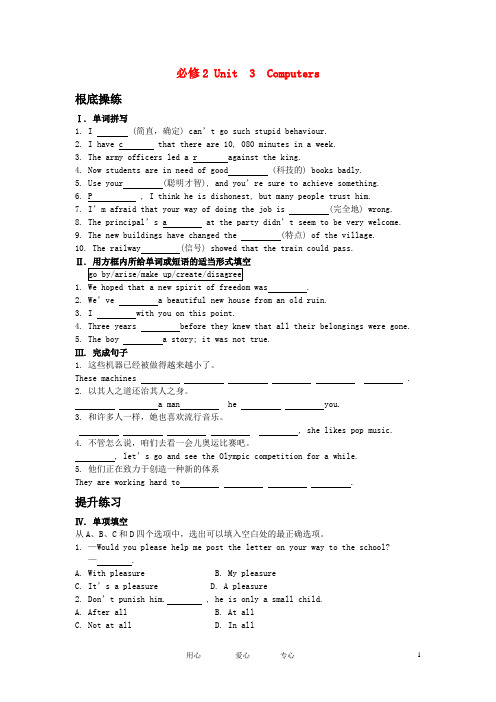
必修2 Unit 3 Computers根底操练Ⅰ. 单词拼写1. I (简直,确定) can’t go such stupid behaviour.2. I have c that there are 10, 080 minutes in a week.3. The army officers led a r against the king.4. Now students are in need of good (科技的) books badly.5. Use your (聪明才智), and you’re sure to achieve something.6. P , I think he is dishonest, but many people trust him.7. I’m afraid that your way of doing the job is (完全地) wrong.8. The principal’s a at the party didn’t seem to be very welcome.9. The new buildings have changed the (特点) of the village.10. The railway (信号) showed that the train could pass.Ⅱ. 用方框内所给单词或短语的适当形式填空1. We hoped that a new spirit of freedom was .2. We’ve a beautiful new house from an old ruin.3. I with you on this point.4. Three years before they knew that all their belongings were gone.5. The boy a story; it was not true.Ⅲ. 完成句子1. 这些机器已经被做得越来越小了。
新人教版高中英语必修2Unit3 Computers教案
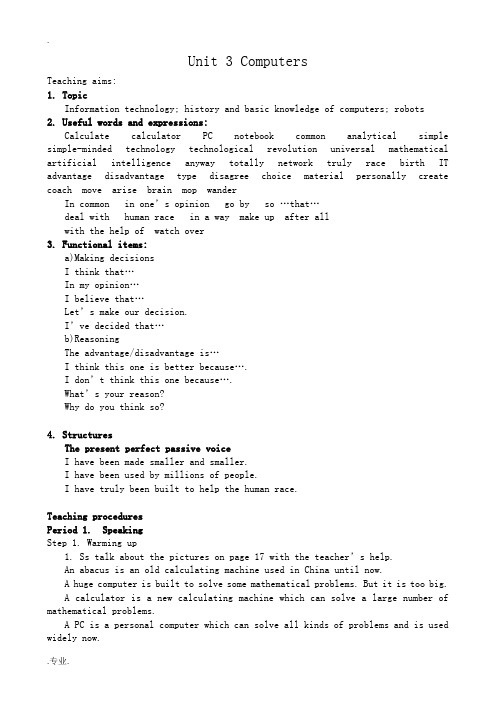
Unit 3 ComputersTeaching aims:1. TopicInformation technology; history and basic knowledge of computers; robots2. Useful words and expressions:Calculate calculator PC notebook common analytical simple simple-minded technology technological revolution universal mathematical artificial intelligence anyway totally network truly race birth IT advantage disadvantage type disagree choice material personally create coach move arise brain mop wanderIn common in one’s opinion go by so …that…deal with human race in a way make up after allwith the help of watch over3. Functional items:a)Making decisionsI think that…In my opinion…I believe that…Let’s make our decision.I’ve decided that…b)ReasoningThe advantage/disadvantage is…I think this one is better because….I don’t think this one because….What’s your reason?Why do you think so?4. StructuresThe present perfect passive voiceI have been made smaller and smaller.I have been used by millions of people.I have truly been built to help the human race.Teaching proceduresPeriod 1. SpeakingStep 1. Warming up1. Ss talk about the pictures on page 17 with the teacher’s help.An abacus is an old calculating machine used in China until now.A huge computer is built to solve some mathematical problems. But it is too big.A calculator is a new calculating machine which can solve a large number of mathematical problems.A PC is a personal computer which can solve all kinds of problems and is used widely now.A notebook computer is a kind of useful computer which can be taken conveniently like a notebook.2. Now let’s discuss what they have in common in small groups. Remember to use some of the following expressions.I think that…In my opinion…I believe that…What’s your reason?Why do you think so?Step 2. Listening (page 55)Ss are asked to read fast the requirement of Ex. 1 and 2 to fink out the listening points first. Then listen to the tape twice to complete Ex.Step 3. Talking (page 56)Imagine that your family is thinking of buying a robot. You can afford these three robots mentioned in the listening text. Please discuss which one is the best for you. Remember to discuss the advantages and disadvantages of each one. Them make your choice and give reasons.Using the following expressions in discussion:I believe that….I think this one is better because…Let’s make our decision…In my opinion…I’ve decided…I don’t like this one because..Period 2. ListeningStep 1. RevisionSs talk about something about computers or robots.Step 2. Listening and writing (page 21)Ask the Ss to read through the directions and look at some pictures below and a form above on page 22. make sure they know what to do while listening.Task1. Listen to a conversation about different kinds of information technology of IT.Task 2. Discussion and fillingSs discuss the advantages and disadvantages of each one in small groups and fillStep 3. Listening task (page 58)1. Ss will be asked to look at the picture and the form quickly to find out the important points.2. Play the tape twice and ask the Ss to fill in the form.HomeworkSs discuss the use of computer chips in their spare time.Period 3. ReadingStep 1. Pre-readingSs in groups discuss the following questions:1. What do you know about computers?2. How have computers changed our lives?Step 3. Reading1. Ss read the passage and get the general idea.(The text is mainly about the history and development of computers. And it is also about the relationship of computers and humans.)2. Ss read the passage and finish the timeline on page 19.Suggested answer:1642: The computer began as a calculating machine.1822: The Analytical Machine was built by Charles Babbage.1936: Alan Turing wrote a book to describe how computers could be made.1960s: Computers had new transistors and become smaller.1960s: The first family of computers connected to each other.1970s: Computers were brought into people’s homes.Now: Computers connect people all over the world together.Step 4. After-reading1. Ss discuss:What changes have computers and the internet brought to schools?What changes will they bring to schools in the future?2. DebatingTopic:Surfing the internet more is good for young students.Surfing the internet more is bad for young students.Homework1. Recite the key sentences in the text.2. Prepare for learning about language.Period 4.(Language learning and grammar)Step 1. RevisionSs try to retell the text, using their own words.Step 2. Language points1. in commonhave nothing in commonhave little in commonhave something in commonhave a lot in common2. simple-mindedabsent-mindedopen-mindednarrow-mindedsingle-mindedstrong-mindedweak-minded3. make a decision4. in a way5. after all6. watch over7. wanderStep 3 Discovering useful words and expressions1. Ss read the text and finish exercise 1 on page 19.2. Ss read the passage on page 20, part 2 and try to complete it with appropriate words.3. Ss look at the sentences in exercises 3 on page 20, and tick the right word.Step 4. Grammar: The present perfect passive voiceShow the Ss the following sentences, and then change them into passive voice.1. We have made a plan.2. He has fixed the computer.Step 5. Practice (discovering useful structures)Ss finish part 2 on page 20.Homework1. Review what they have learnt about the present perfect passive voice.2. Finish Wb exercises 1 and 2 on page 56 and 57.3. Finish using structures, exercise 1 on page 57.Period 5. Extensive ReadingStep 1. RevisionCheck Ss’ homework.Step 2. Reading (P22)1. Ss read the passage and discuss how to design their own android.2. Ss answer the following questions:1). What would you like it to look like?2). What are some of the things you would like it to do?3). Do you want it to be like a man or a woman, or neither?4). How much would it cost?3. Ss read and finish True of False questions.4. Check the answers.Step 3. Reading (page 58)1. Ss read the passage on page 58 quickly.2. Ss fill in the form of Ex.1 and keep a record of his performances.Step 4. Speaking1. Imagine you have been lucky enough to be allowed to interview Hua Fei in hospital for your school newspaper. Work out some questions.2. Ss play roles in pairs. One of you will interview Hua Fei. The other will imagine he/she is Hua Fei. Then change roles. Finally, take notes of your partner’s answers to the questions.HomeworkPrepare your writing for the newspaper.Period 6. WritingStep 1. Speaking and writing (page 22)1. T: Suppose you and your partner have been asked to help choose computers for your school. You have looked at several computers. Talk about the special things each computer has. Make a decision about which kind of computer to buy and explain why. There is a list of things your computer could have on page 22.A fast PC the monitor is smallerImproved disc storage used recycled materialsInternet a flat screen2. Ss talk about the special things each computer can do and write a report.3. Ss read their report in class.Step 2. Writing (page 23)1. T: suppose you are an android and work for a family with one child who is very spoiled. The parents want you to do everything for them. The parents are kind, but they often ask you tko watch over their child. How do you feel? What would you do if the child asked you to do his/her homework for him/her? Would you tell the child “no〞?2. Ss write their passage with the beginning on page 23.Step 3. Writing task (page 60)Ss try to finish the writing task on page 60 if time permits.HomeworkFinish the project on page 60.Period sevenTeachers can use this period freely.Suggestion: Teachers can use this period to let Ss sum up what they have learned and explain what Ss couldn’t understand very well in this unit. Teachers can also add more practice in this period to consolidate what the Ss have learned. Finally, ask the Ss to finish checking yourself. It is very important to improve their learning.。
高中英语必修2《Unit 3 Computers》
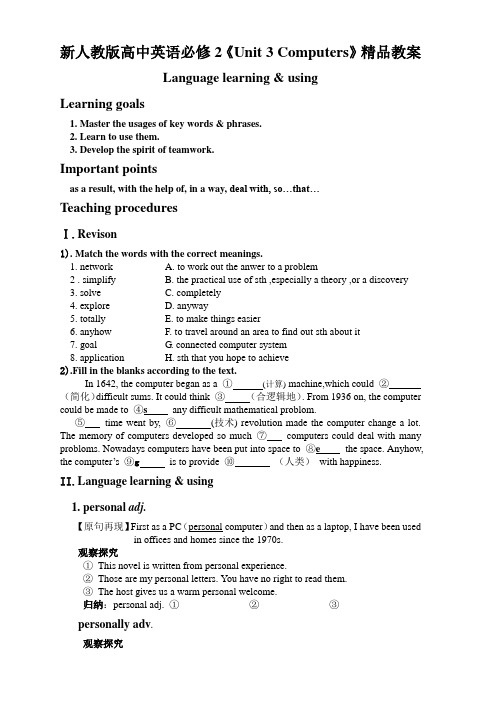
新人教版高中英语必修2《Unit 3 Computers》精品教案Language learning & usingLearning goals1. Master the usages of key words & phrases.2. Learn to use them.3. Develop the spirit of teamwork.Important pointsas a result, with the help of, in a way, deal with, so…that…Teaching proceduresⅠ.Revison1). Match the words with the correct meanings.1. network A. to work out the anwer to a problem2 . simplify B. the practical use of sth ,especially a theory ,or a discovery3. solve C. completely4. explore D. anyway5. totally E. to make things easier6. anyhow F. to travel around an area to find out sth about it7. goal G. connected computer system8. application H. sth that you hope to achieve2).Fill in the blanks according to the text.In 1642, the computer began as a ①(计算) machine,which could ②(简化)difficult sums. It could think ③(合逻辑地). From 1936 on, the computer could be made to ④s any difficult mathematical problom.⑤time went by, ⑥(技术) revolution made the computer change a lot. The memory of computers developed so much ⑦computers could deal with many probloms. Nowadays computers have been put into space to ⑧e the space. Anyhow, the computer’s ⑨g is to provide ⑩(人类)with happiness.nguage learning & using1. personal adj.【原句再现】First as a PC(personal computer)and then as a laptop, I have been used in offices and homes since the 1970s.观察探究①This novel is written from personal experience.②Those are my personal letters.You have no right to read them.③The host gives us a warm personal welcome.归纳:personal adj.①____________ ②____________ ③____________personally adv.观察探究①Personally, I am against his plan.②The host welcomed his guests personally.归纳:personally ①____________ ②____________2. as a result【原句再现】As a result I totally changed my shape.观察探究①It doesn't often rain in summer. As a result,we have to water the garden.②As a result of the accident, he became lame(跛).as a result意思是_______,只能单独用;as a result of= ___ _ __, 意思是_______ 即学活用A. 用as a result或as a result of 填空。
人教版高中英语必修二 unit 3 computers Reading课件3
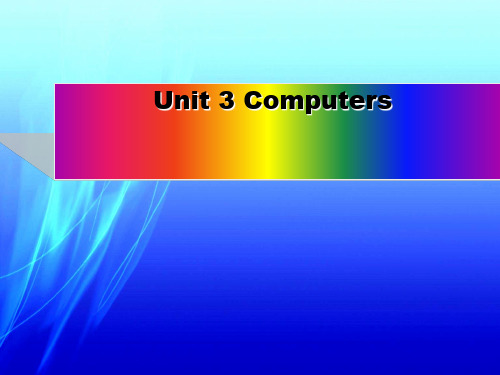
Thank you!
7、自知之明是最难得的知识。——西班牙8、勇气通往天堂,怯懦通往地狱。——塞内加9、有时候读书是一种巧妙地避开思考的方法。——赫尔普斯10、阅读一切好书如同和过去最杰出的人谈话。——笛 卡儿11、越是没有本领的就越加自命不凡。——邓拓12、越是无能的人,越喜欢挑剔别人的错儿。——爱尔兰13、知人者智,自知者明。胜人者有力,自胜者强。——老子14、意志坚强的人能把世界放在手 中像泥块一样任意揉捏。——歌德15、最具挑战性的挑战莫过于提升自我。——迈克尔·F·斯特利16、业余生活要有意义,不要越轨。——华盛顿17、一个人即使已登上顶峰,也仍要自强不息。——罗素·贝 克18、最大的挑战和突破在于用人,而用人最大的突破在于信任人。——马云19、自己活着,就是为了使别人过得更美好。——雷锋20、要掌握书,莫被书掌握;要为生而读,莫为读而生。——布尔沃21、 要知道对好事的称颂过于夸大,也会招来人们的反感轻蔑和嫉妒。——培根22、业精于勤,荒于嬉;行成于思,毁于随。——韩愈23、一切节省,归根到底都归结为时间的节省。——马克思24、意志命运往 往背道而驰,决心到最后会全部推倒。——莎士比亚25、学习是劳动,是充满思想的劳动。——乌申斯基26、要使整个人生都过得舒适、愉快,这是不可能的,因为人类必须具备一种能应付逆境的态度。— —卢梭27、只有把抱怨环境的心情,化为上进的力量,才是成功的保证。——罗曼·罗28、知之者不如好之者,好之者不如乐之者。——孔子29、勇猛、大胆和坚定的决心能够抵得上武器的精良。——达·芬 奇30、意志是一个强壮的盲人,倚靠在明眼的跛子肩上。——叔本华31、只有永远躺在泥坑里的人,才不会再掉进坑里。——黑格尔32、希望的灯一旦熄灭,生活刹那间变成了一片黑暗。——普列姆昌德33、 希望是人生的乳母。——科策布34、形成天才的决定因素应该是勤奋。——郭沫若35、学到很多东西的诀窍,就是一下子不要学很多。——洛克36、自己的鞋子,自己知道紧在哪里。——西班牙37、我们唯 一不会改正的缺点是软弱。——拉罗什福科38、我这个人走得很慢,但是我从不后退。——亚伯拉罕·林39、勿问成功的秘诀为何,且尽全力做你应该做的事吧。——美华纳40、学而不思则罔,思而不学则 殆。——孔子41、学问是异常珍贵的东西,从任何源泉吸收都不可耻。——阿卜·日·法拉兹42、只有在人群中间,才能认识自己。——德国43、重复别人所说的话,只需要教育;而要挑战别人所说的话,则需 要头脑。——玛丽·佩蒂博恩·普尔44、卓越的人一大优点是:在不利与艰难的遭遇里百折不饶。——贝多芬45、自己的饭量自己知道。——苏46、我们若已接受最坏的,就再没有什么损失。——卡耐47、书到 用时方恨少、事非经过不知难。——陆游48、书籍把我们引入最美好的社会,使我们认识各个时代的伟大智者。——史美尔49、熟读唐诗三百首,不会作诗也会吟。——孙50、谁和我一样用功,谁就会和我 一样成功。——莫扎特51、天下之事常成于困约,而败于奢靡。——陆游52、生命不等于是呼吸,生命是活动。——卢梭53、伟大的事业,需要决心,能力,组织和责任感。 ——易卜生54、唯书籍不 朽。——乔特55、为中华之崛起而读书。——周恩来56、书不仅是生活,而且是现在、过去和未来文化生活的源泉。——库法耶夫57、生命不可能有两次,但许多人连一次也不善于度过。——吕凯特58、问 渠哪得清如许,为有源头活水来。——朱熹59、我的努力求学没有得到别的好处,只不过是愈来愈发觉自己的无知。——笛卡儿60、生活的道路一旦选定,就要勇敢地走到底,决不回头。——左拉61、奢侈 是舒适的,否则就不是奢侈。——CocoChanel62、少而好学,如日出之阳;壮而好学,如日中之光;志而好学,如炳烛之光。——刘向63、三军可夺帅也,匹夫不可夺志也。——孔丘64、人生就是学校。在那 里,与其说好的教师是幸福,不如说好的教师是不幸。——海贝尔65、接受挑战,就可以享受胜利的喜悦。——杰纳勒尔·乔治·S·巴顿66、节制使快乐增加并使享受加强。——德谟克利特67、今天应做的事 没有做,明天再早也是耽误了。——裴斯泰洛齐68、决定一个人的一生,以及整个命运的,只是一瞬之间。——歌德69、懒人无法享受休息之乐。——拉布克70、浪费时间是一桩大罪过。——卢梭71、既然 我已经踏上这条道路,那么,任何东西都不应妨碍我沿着这条路走下去。——康德72、家庭成为快乐的种子在外也不致成为障碍物但在旅行之际却是夜间的伴侣。——西塞罗73、坚持意志伟大的事业需要始 终不渝的精神。——伏尔泰74、路漫漫其修道远,吾将上下而求索。——屈原75、内外相应,言行相称。——韩非76、你热爱生命吗?那么别浪费时间,因为时间是组成生命的材料。——富兰克林77、坚强 的信心,能使平凡的人做出惊人的事业。——马尔顿78、读一切好书,就是和许多高尚的人谈话。——笛卡儿79、读书有三到,谓心到,眼到,口到。——朱熹80、读书之法,在循序而渐进,熟读而精 思。——朱熹81、对一个人来说人不可有傲气,但不可无傲骨。、起点可以相同,但是选择了不同的拐点,终点就会大03、拿望远镜看别人,拿放大镜看、命运如同手中的掌纹,无论多曲折,终掌握在、站
人教版高中必修二Unit3 Computers words and expressions 课件(41页ppt)

人教版高中必修二Unit3 Computers words and expressions 课件(41页ppt)
so...that...如此...以致于...
The bag is so heavy that I can't carry it. The car is so expensive that I can't afford it. She was so angry that she couldn't speak
人教版高中必修二Unit3 Computers words and expressions 课件(41页ppt)
人教版高中必修二Unit3 Computers words and expressions 课件(41页ppt)
Alan Turing
人教版高中必修二Unit3 Computers words and expressions 课件(41页ppt)
人教版高中必修二Unit3 Computers words and expressions 课件(41页ppt)
人教版高中必修二Unit3 Computers words and expressions 课件(41页ppt)
application [ˌæplɪˈkeɪʃn] n. 申请;请求;申请书;申请表;
He worked hard at his study.As a result, he passed the exam easily.
人教版高中必修二Unit3 Computers words and expressions 课件(41页ppt)
人教版高中必修二Unit3 Computers words and expressions 课件(41页ppt)
人教版高中英语必修2教案Unit 3 Computers

人教版高中英语必修2教案Unit 3 ComputersThe topic of this unit are information technology,history and basic knowledge of computers and robots。
The main theme is computers which is connected with teaching students a little more of the history and development of computers and applications computers will be vital to the modernization of China.It is important for students to understand that the development of computers has been a very recent thing which has only been 100 years since Charles Babbage began to make his first machine that was the predecessor of the personal computers we use today. Understanding the history of computers will help the students to see that there will be many changes ahead in the development of computers and arouse students` interest in learning computers.New words and collocations: calculate, universal, simplify, sum, operator, logical, technology, technological, revolution, artificial, intelligence, intelligent, solve, reality, personal, tube, total, net work, web, application, finance, mobile, rocket, explore, anyhow, goal, happiness, download, virus, signal, type, coach, arise, electronic, appearance, character, mop, niece, from….on…, as a result, so …that…, human race, in a way, with the help of, deal with, watch overAbility aims: arouse the students` great interest in learning computers and let them learn to use them in their daily life.Difficult points: how to develop students` reading skills, express their opinions and use personification and chronology when writing.Important points: let them learn more about the history and basic knowledge of computers and different reading skills.Step 1 Leading in the topic1. Show them some pictures of an abacus, a calculator, a huge computer, a laptop anda PC. In some groups, discuss what they have in common, and then rank them according to the time of their appearance.2. Ask students to give their opinions and remind them of using the following expressions:I think that ……In my opinion, ……I believe that……What`s your reason?Why do you think so ?3. Ask some students to talk about what they know about computers.Step 2. Predicting by talking free1. Ask students to look at the heading and picture to guess what the passage might be about.2. Ask some students to give their opinions by answering the question: How have computers changed our life? Do you know in what ways computers are used today?Step 3. Reading1. Look at the picture and title to predict what the passage might be about?3. Read the text carefully for the information to complete the table below, describing4.根据课文内容填空5. Read the text again to underline the expressions and write down into their notebook after class as homework: begin as, a calculating machine, be built as, as that time, a technological revolution, artificial, intelligence, write a book, make…work as, solve problems, from then on, in size, both…and…, by the 1940s, go by, as a result, change one`s shape, so ….that…, be lonely, stand there by oneself, be connected by, share one`s knowledge with…, become important in…, put…into…., as well as, provide….with…, be filled with…, a devoted friend, the human race5. Listen to the text and skim the text once more and identify the difficult sentences. Let them try analyzing the structures of them.Step 4 Interview gamesAsk students to work in pairs. Suppose one is a journalist and the other is a computer, the journalist is interviewing the computer.Step 5 Learning personification and chronologyPersonification means to treat something as if it were human or had human qualities. It is of the most effective ways of using words figuratively.Chronology means to describe things in order of time which is often used in recounting an event or describing the life of someone. It is an effective way to make a mass of things clear.An version:I, the computer, was a calculating machine in 1642 in France. Then I was built as an Analytical Machine, which was a technological revolution. I became a “universal machine” in 1936 to solve any mathematical problem. I was not very big at first then I became huge, the size of a large room before I was made smaller and smaller.I became clever and quicker and was connected with other computers and turned out to be part of a network in the early 1960s. I was brought into people`s, and many new applications have been found for me.Step 5 Closing down by spoken practiceTalk about the development of computers by answering the questions:1). Do you have your own computer at home?2). How familiar with computers do you think you are?3). How many times do you access the Internet newspaper in a week?4). How many times do you access the World Wide Web in a week?5). How many times do you send the e-mails in a week?6). How many hours do you spend in internet “chat” group in a week?7). Do you think the commercial services on the net are reliable?8). In general, how positive or negative an experience is it for you to work with computers?9). In general, what effects do you think the computer technology has had on your study?10). In general, what effects do you think the computer technology has on human societies and cultures?Step 6 Homework1. Go over the text, and try to learn all the useful words and expressions by heart2. Finish the exercises in comprehending on page 19.Artificial intelligence means man-made intelligence while “real intelligence”is the intelligence that human that human beings are born with. The term “artificial” includes all the calculations that a computer can do. It is different from human intelligence because itonly works with electricity and can be turned off when the machine is unplugged fro the wall.Transistors are a way of sending and storing information that only take up a small space. They meant that computer could be made smaller and they led to computers becoming small and personal.A network is a number of computers that are joined together so that they all show the same program. So a number of students can work in the same room on the same program but at different computers.The Internet (WWW) is a worldwide information resource where people can do research, go shopping or sending messages to friends. When they send messages they do it by “e-mail” or “electronic mail”. The messages are sent by satellite to special place on the ground that can receive them. Them they are sent to the address where the person can open them and read them like a letter.The 1970s was when computers became small enough to come into people`s homes. These computers are called “personal computers”.The second period: Learning about important language pointsKnowledge aims:1. Get students to learn and grasp the important useful new words and expressions: calculating, calculator, PC, laptop, common, simplify, simple-minded, artificial intelligence, anyhow, totally, network, truly, race, birth, go by, deal with, human race2. Important useful sentence patterns:1) I began as a calculating machine in France in 1642.2) As time went by, I was made smaller and smaller.3)And my memory became so large that even I couldn`t believe it.3. Ability aims:Get students to use some useful new words and expressions correctly.4. Emotion aims:Stimulate students` interest in learning English and the spirit of cooperation.5. Important points:Enable them to grasp the usages of such important new words and expressions as common, any how, in common, in one`s opinion, deal with, etc.Get them to master the pattern “And my memory became so large that even I couldn`t believe it.”6. Difficult points:How to get the students to master the usages of the important expressionsGet students to understand some difficult and long sentences.Step 1 RevisionCheck the homework exercises.Ask some students to retell the development of computers.Step 2 V ocabulary study2. Review the new words and expressions in all the parts and have a dictation.Step 3 Practice for useful words and expressions1. Let students do exercise 1 in Learning about Language on page 20 and then check the answers.2. Question students on the meanings of those new words which will be used in Exercise 2 in Learning about Language on page 20.3. Explanation of some important words and expressions.1). common:usual or familiar; happening or found often in many places; shared by, belong to, done by or affecting most of the same group.Snow is common in cold countries.We shared a common purpose.He and I have a common interest; we both collect stamps.The common man in every country is anxious for the world peace.His ordinary supper consists of only bread and milk.This book is intended for the general reader, nor for the specialist.in common withhave nothing / something / little / a lot in common2). calculate: work out by using numbers or one`s judgment; estimateCalculate the cost of a journeyScientists have calculated that the world`s population will double by the end of the century.I calculate that we will reach Beijing at about 3 pm.Be calculated for / toIt is calculated that ….Calculate on / upon3) simplifyThis dictionary tries to simplify the meanings of words.4). so…that…He is such a kind man that everyone likes him.He started so early in the morning that he caught the first train.Those were such expensive books that we couldn`t afford to buy them.I made so many mistakes that I failed the exam.There is so little time that we couldn`t finish the task on time.5). in a wayYou`re quite right in a way.on the waybe in the waymake one`s wayfeel one`s way6). arise: become evident; appear; originateA new difficult has arisen.Use this money when the need arises.Arise from / out of sth. : follow as a result of sth.4. Sentence focus1). I began as a calculating machine in France in 1642.A walking stick, a swimming poo, a washing machine, a sleeping boy, exciting news 动名词作定语表示所修饰的名词的用途2). In 1936 my real father, Alan Turing, wrote a book about how I could be made to work as a “universal machine” to solve any difficult mathematical problem.how I could be made to work as a “universal machine”to solve any difficult mathematical problem.是宾语从句3). however, this reality also worried my designers.However.adv.可是, 然而; conj. 不论, 不管;We haven`t yet won, however, we shall try again.He hasn`t arrived,. He may, however, come later.He can answer the question however(=no matter how) hard it is.However sly(狡猾) a fox may be, it is no match for a good hunter.You will be lucky if he lets you go without a ticket. However, this does not always happen.Sally was amused, but I was very embarrassed.4). As time went by, I was made smaller.as time went by是时间状语从句,主句的谓语形式是一般过去时的被动语态.5). Over time my memory has developed so much that, like an elephant, I never forget anything I have been told. 比喻句子An elephant never forget. 大象永远不会遗忘.6). And my memory became so large that even I couldn`t believe it.用so….that….引导结果状语从句So bright was the moon that the flowers were bright by day. so连同它所修饰的形容词或者副词放在句首,表示强调.Step 4 Using words, expressions and patterns1. Do exercises 1 and 2 on page 56 in Using words and expressions2. Translate the sentences into English, using the words and expressions given in brackets.1). 在老师的帮助下, 你会发现处理和分享信息是不难的. (with the help of)2). 你很容易通过因特网与世界各地的人们进行交流. (communicate)3). 为每位教师购置一台电脑要花费很多钱,但这很值得. (After all)4). 她电脑用得好,现在很少用纸和笔写字了. (so…..that….)5). 如果出现新的情况, 他们会补充新的程序. (make up)Step 5 HomeworkFinish off the Workbook exercisesLearn the new words and expressions by heartThe third period: Learning about grammarStep 1 Revision1. Check the homework exercises.2. Dictate some new words and expressions.3. Translate the sentences into English1). 这消息太好了,简直不能相信.2). 他走得太匆忙了,以至于忘了带伞.Step 2 Grammar revision1. Revise the passive voice:the present passive voice: be + p.p;the present future passive voice: shall / will be + p. p2. Fill in the blanks with the right form of the verb given.1). Sailing races are held (hold) on the lake at 11 Tuesday.2). Food is served (serve) between 12:00 and 14:00 every day.3). Nobody will be allowed (allow) to enter the stadium without a ticket.4). Whoever breaks the law, he will be punished (punish).Step 3 Grammar learning1. Reading aloud and discovering by asking students to go back to page 18 to read the passage Who am I ? to pick out the present perfect passive voice and translate them into Chinese.Over time I have been changed quite a lot.I have been used in offices and home since the 1970s.I never forget anything I have been told.Since the 1970s many new applications have been found for me.I have also been put into space rockets…I have even been robots and used to make mobilphones.2. Look and think to sum up the structure of the present perfect passive voice: Have / has + been + p.pStep 4 Grammar practicehave / has done--------have / has been done现在完成时以及被动语态1.Change the following into the present perfect passive voice.We have made a plan.He has fixed the computer.We have bought a new personal computer.We have found many problems with our new computer.They have built a PC the way we wanted.We have used the computer every day since we bought it.We have written a lot of emails on the computer in the past years.2.Check errors in these sentences.3000 employees were laying off / laid off.A story will / be made up.An idea was putted / put forward for discussion.Has the book been give / given back to you yet?My bank loan will be payed / paid off in five years time.Nothing can be hold / held against me.She has never / been heard of.She was being /x knocked down by a bus.She was letted / let off with a fine.The candle was blow /blown out by the draught.The criminal were / was locked up.The flood water was be / x kept back by barriers.The inconvenience will / be made up for by this money.The keys must have been being / x left behind.The old cinema is being pull / pulled down.The protesters / are being held back by the police.Your jacket can be hanged / hang up over there.Step 5 consolidationAsk the students to do the exercises in Using structures on page 57.Step 6 HomeworkFinish off the workbook exercises.Preview the passage Andy-The Android on page 23. find the sentences in which the present perfect voice has been used, and see if you can put it into the active voice.Computer jargon (计算机行话)Bit : the smallest data unit, can either be a “0” or a “1”Byte: unit of data. See also Kilobyte, Megabyte, Gigabyte and Nibble.CPU: Central Processing Unit, another name for processorData: information stored on a computerDisk: A place to store dataLoad: Get data from a diskSave: Put data on a diskUSB: Universal Serial BusWWW: World Wide Web, part of the InternetThe Fourth period: Using Language: Listening and TalkingKnowledge aims:(1). Get the students to learn some useful new words and expressions;(2). Let the students learn the expressions of giving opinions, reasoning and making a decision: I think that….., in my opinion, ……., I think this is because ……., I don`t likethis ……, the advantage is….., let`s make our decision to do ……, I have decided …..Ability aims: enable them to catch and understand the listening materials to develop their listening ability.Important points: develop the students` listening and speaking ability to master different listening skills. Let them learn how to give opinions, reasons and make a decision.Difficult points: how to get them to listen and understand the materials correctly and how to develop their speaking ability.Step 1 RevisionCheck the homework exercises.Ask some students to translate some sentences using the present perfect passive voice.Step 2 Warming up by talking about ITWhat is information technology/ Information technology (IT) or information and communication technology (ICT) is the technology required for information processing. In particular the use of electronic computers and computer software to convert, store, protect, process, transmit and retrieve information from anywhere, anytime.Step 3 Listening and speaking on page 22Listen to the conversation about different kinds of information technology. Discuss the topic and add some advantages and disadvantages, write down the advantages and disadvantages in the chart on page 22.Step 4 Listening on page 551. Ask students to look at the 4 pictures and listen to the tape to find the three mentioned in the listening text and number them.2. Let them look at the boxes and then listen to the tape part by part to fill in the boxes.Step 5 Talking on page 551. Ask the students to read the directions and the expressions of giving opinions, reasoning and making a decision given below.2. Let the students list the advantages and disadvantages of each robot.3. Ask them have a discussion and make a decision which one is the best and give some reasons.Step 6 listening task on page 581. Ask students to discuss the following questions:What can the androids do for our everyday life?What else can they do for human beings?What can the androids do all these useful things for human beings?What are the similarities between robots and human beings?What are the differences between robots and human beings?Can androids become human beings in the future?2. Ask students to read the directions and listen to the tape to fill in the blank.3. Let students have a discussion on the rights that androids should have so that they will be treated better.Step 7 HomeworkFinish off the Workbook exercisesPreview the passage Andy—the android.The fifth period: Using language: Reading and SpeakingThis unit , the teaching emphasis will be put on developing students` reading abilities by reading extensively and speaking abilities by using the expressions of giving opinions, reasoning and making a decision to discuss in groups the advantages and disadvantages of having sporting robots take the place of human players.Ability aims: train students` speaking ability and enable them to learn how to give opinions, reasoning and make a decision.Important points:(1). Develop the students` reading skills by extensive reading.(2).Train students` speaking abilities by using the expressions giving opinions, reasoning and making a decision.Difficult points: how to get them learn to use reading strategies such as skimming and scanning. How to give opinions, reasons and make a decision.Step 1. Revision1. Check the homework exercises.2. Ask the students to go over Using words and expressions on page 56 to know more about the computers.Step 2. Warming up by a group discussion1. Ask students to talk about Andy—the android.2. Divide the students into several groups to discuss the advantages and disadvantages of having sporting robots to take the place of human players.Step 3 Reading the Sporting Robot on page 58-591. Look at the title and pictures and then guess what the passage is about.2. Skim for the answer to the following questions.What is Hua Fei?What is Hua Fei good at?What can it do?Did Hua Fei win any medal in the 79th Olympics?What problem does Hua Fei have now?3. Scan the text to get the detailed information and then do the exercise 1 on page 59.4. Practice reading aloud the second paragraph while listening to the tape.Step 4 Speaking task on page 59-60Have a discussion to work out the questions to be used to interview Hua Fei. After several minutes, ask some students to play it out.Step 5 Summing upAsk the students to think over the following questions and then sum up the expressions and the passage.1). What expressions do you use when giving opinions, reasons and making a decision.2). How do you feel after reading the passage The Sporting Robot? Do you think what will happen?Step 6 HomeworkFinish off the Workbook exercises.Find out information about robots and share with your classmates.The sixth period: Using language: Speaking, Reading and WritingThe emphasis of this unit is laid on developing students` writing ability which is the best way to test if students have mastered what they have learned.Ability aims: Get the students to learn to think creatively.Important points: Develop students` writing ability by using the expressions to give opinions, reasons and make a decision.Difficult points: How to get them to think creatively to understand others` feelings.Step 1. Revision1. Check the homework.Step 2 Warming upImagine computers can be put into different kinds of android. Show students some pictures of different kinds of android.Talk about football androids or other sporting androids.Step 3 ReadingRead the passage Andy—the android and underline all the useful expressions and new words.Read it again to get the main idea.Step 4 Discussing how to design an androidDiscuss how to design their own android, the following questions may help:What would you like it to be?What would you like it to do?Step 5 Selling computersFirst, have a discussion in pairs intending to sell computer to someone. Then get them write a report to persuade the other to buy the robot by giving 3 or more reasons.Step 6 WritingSuppose you are a famous reporter. You have interviewed Hua Fei, a sporting robot. Now you write a news article for the school newspaper.1. Show them English newspapers and let them discuss how to make a heading for news article.2. Ask students in groups to discuss and decide what the heading will be and what the best things are to be written.3. Students finish their articles.Step 7 HomeworkFinish writing on page 23 and write it down on your exercise book.补充练习1) The teacher told his students to bring out their notebooks to put down what he said.2) The army offices led a / an revolution against the king.3) Many advanced technologies have been introduced to this factory from abroad.4) Use your intelligence, and you are sure to achieve something.5) Mrs. White gave birth to a fine healthy baby in her late thirties.6) Some of the best brains in the province are here tonight.7) One careless move loses the whole game.8) She had to make a / an choice between the two dresses.9) White races are more respected than the black in Africa.10) It is said that he is collecting materials for his book.11) Sara got injured in a train accident half a year ago and suffered from back pain from then on.12) Have these pills three times a day and if they don’t work out, just go back to me.13) All the volunteers were divided into four groups according to their abilities and strengths.14) Bob told us a funny joke. As a result, the whole room was filled with laughter.15) Miss Lin often shares her students’ interesting ideas with their parents by email.16) With the help of the computer and the Internet, I have made several e-friends from America and Canada.17) Making a plan before you do something can help you deal with some unexpected situations.18) In a way, the Internet may have negative influence on teenagers by the bad information on it.19) An expert swimmer was trained and employed to watch over other swimmers at the swimming pool.20) The whole sum was so big that the boss had to have another person calculate it again.1). Though they are twins, they have nothing in common.2). In my opinion, you are wrong.3). Two years went by before we knew it.4). I don`t know how to deal with the bad children.5). The teacher asked the children to make up a story about a trip to the moon.6). It has turned out to be a nice day after all.7). The man is being watched over by the police.8). With the help of the teacher, I succeeded in doing the experiments.9). In a way, the strange animal looks like a bear.10). Computers are used to connect people who are not close enough to speak each other.3.Choose the best answers.1). Millions of pound`s worth of damage _____ by a storm which swept across the north of England last night.A. has been causedB. had been causedC. will be causedD. will have been caused2). A new cinema _____ here. They hope to finish it next month.A. will be builtB. is builtC. has been builtD. is being built3). The police found that the house _____ and a lot of things _____.A. has broken into; has been stolenB. had broken into; had been stolenC. has been broken into; stolenD. had been broken into; stolen4). ____ the sports meet might be put off.-----Yes, it all depends on the weather.A. I have been toldB. I have toldC. I am toldD. I told5). All the preparations for the task _____, and we are ready to start.A. completedB. completeC. had been completedD. have been completed6). Both my brothers work at the power station that _____ at my home town.A. has set upB. has been set upC. was set upD. is set up7). ------ The window is dirty.------ I know. It _____ for weeks.A. hasn`t cleanedB. didn`t cleanC. wasn`t cleanedD. hasn`t been cleaned8). Months ago we sailed ten thousand miles across the open sea, which _____ the Pacific, and we met no storms.A. was calledB. is calledC. had been calledD. has been called9). There have been six Chinese Americans who _____ the Nobel Prize for their outstanding contributions to science so far.A. have been awardedB. had been awardedC. were awardedD. awarded10). Jim asked whether my father was one of those sailors who ____ to Somalia.A. has been sentB. have been sentC. have sentD. has sent11). More and more websites _____ on the Internet in recent years to help children solve psychological problems.A. has set upB. was set upC. have been set upD. had been set up12). When and how to start the new plan at school ____ yet.A. are not decidedB. have not been decidedC. had not been decidedD. has not been decided13). ----Did you see the bottle of cola I drank last night?----I suppose it _____ by now.A. was thrownB. had been thrownC. has been thrownD. is thrown14). Do pay attention to what _____ on my notebook.A. has markedB. has been markedC. had markedD. had been marked15). Although medical science develop rapidly, the useful methods to treat AIDS _____.A. didn’t discoverB. haven’t discoveredC. Hadn’t been discoveredD. Haven’t been discovered16). -----The flight to New York _____ until tomorrow morning-----No wonder I hear so many complains from the passengers.A. has been delayedB. delaysC. delayedD. is being delayed17). So far, five of the twelve bronze animals heads in Yuanmingyuan _____.A. have been returnedB. have returnedC. has been returnedD. returned18). More homeless people _____ by the government this year than last year.A. savedB. have been savedC. had been savedD. have saved4.Turn the following sentences into passive voice.1). They asked me to come a little late.→I ____ _____ to come a little late.2). Women often talk about food and clothes.→Food and clothes _____ often _____ _____ by women.3). Do they make this kind of truck in Nanjing?→_____ this kind of truck _____ in Nanjing?。
人教版必修二Unit3-Computers-词汇修改
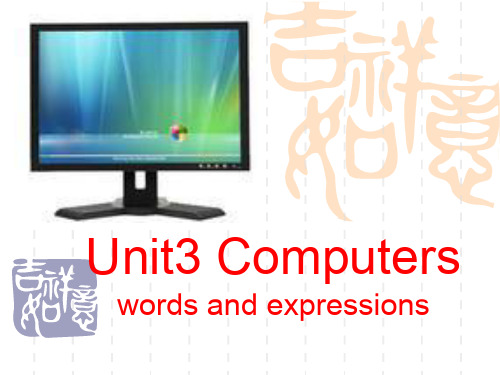
Nouns
niece
侄女, 外甥女 (侄子?)
coach
教练
operator
操作员,接线员
programmer 程序员 ,程序师
mop rocket virus
拖把,vt 用拖把拖(过去式?) 火箭 病毒
Rocket
mop virus
signal v.
n.
She signaled to us for help. The driver signaled to show that he was turning right.
The red light signals (to) the cars to stop. She signaled that it was time to leave. A red light is usually a signal of danger.
About computers
PC = personal computer
PDA =personal digital assistant
IT =information technology
TR =technological revolution
AI =artificial intelligence
Phrases from …on as a result in a way with the help of deal with watch over so…that …
从…时起 结果 在某种程度上 在….的帮助下 处理,安排 ,对付 看守, 监视 如此…以致于
Fill in the blankets with the phrases. 1.Here!You have to hold your future! Set oufrtom__n_ow__o.n
人教版高中英语必修2Unit3Computers词汇学习 新
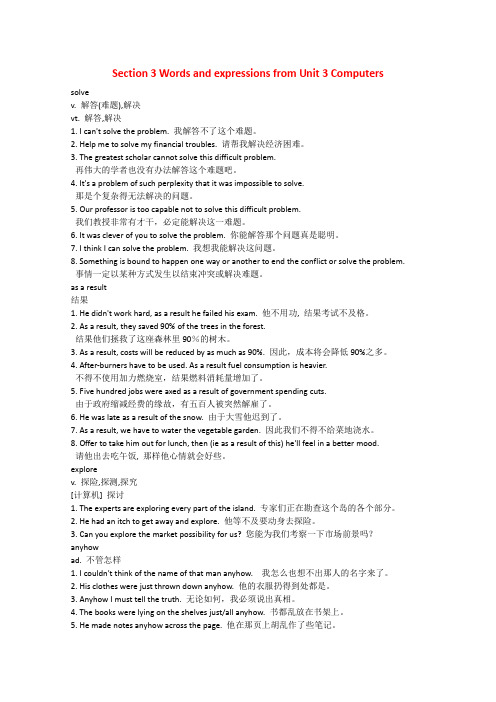
Section 3 Words and expressions from Unit 3 Computerssolvev. 解答(难题),解决vt. 解答,解决1. I can't solve the problem. 我解答不了这个难题。
2. Help me to solve my financial troubles. 请帮我解决经济困难。
3. The greatest scholar cannot solve this difficult problem.再伟大的学者也没有办法解答这个难题吧。
4. It's a problem of such perplexity that it was impossible to solve.那是个复杂得无法解决的问题。
5. Our professor is too capable not to solve this difficult problem.我们教授非常有才干,必定能解决这一难题。
6. It was clever of you to solve the problem. 你能解答那个问题真是聪明。
7. I think I can solve the problem. 我想我能解决这问题。
8. Something is bound to happen one way or another to end the conflict or solve the problem. 事情一定以某种方式发生以结束冲突或解决难题。
as a result结果1. He didn't work hard, as a result he failed his exam. 他不用功, 结果考试不及格。
2. As a result, they saved 90% of the trees in the forest.结果他们拯救了这座森林里90%的树木。
人教版高中英语必修2《Unit 3 Computers》教案2篇
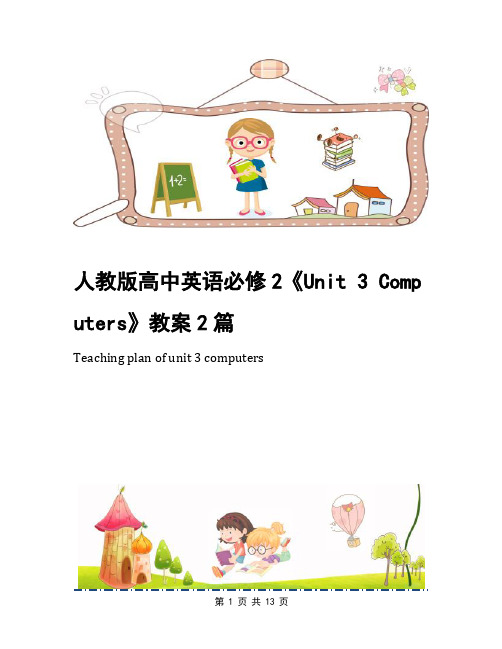
人教版高中英语必修2《Unit 3 Comp uters》教案2篇Teaching plan of unit 3 computers人教版高中英语必修2《Unit 3 Computers》教案2篇前言:英语作为在许多国际组织或者会议上都是必需语言,几乎所有学校选择英语作为其主要或唯一的外语必修课。
英语教学涉及多种专业理论知识,包括语言学、第二语言习得、词汇学、句法学、文体学、语料库理论、认知心理学等内容。
本教案根据英语课程标准的要求和教学对象的特点,将教学诸要素有序安排,确定合适的教学方案的设想和计划、并以启迪发展学生智力为根本目的。
便于学习和使用,本文档下载后内容可按需编辑修改及打印。
本文简要目录如下:【下载该文档后使用Word打开,按住键盘Ctrl键且鼠标单击目录内容即可跳转到对应篇章】1、篇章1:人教版高中英语必修2《Unit 3 Computers》教案2、篇章2:人教版高中英语必修2《Unit 3 Computers》教案篇章1:人教版高中英语必修2《Unit 3 Computers》教案教学准备教学目标1.To practise listening comprehension.2.To practise making decisions and reasoning教学重难点1.To practise listening comprehension.2.To practise making decisions and reasoning教学工具课件教学过程Step1.revision1.check the homework exercises.1). It has been reported that children will be offered free education.It has been reported that free education will be offered to children.2). It has been said that we will be offered the latest computer science course book.It has been planned that the latest computer science course book will be offered to us.3). I have been told by Peter that I will be lent his notebook computer for a week.I have been told by Peter that his notebook computer will be lent to me for a week.2.Question: What can computers be used as?Step2.Lead-inAs we know, science and technology is developing very fast and computers have become smaller and smaller. They have been used in many fields. So, the 21st century is the century of information technology What does it mean? Does information technology/ IT only mean things like computers? Of cause not. Actually, it means more than computers. Computers are just one kind of IT. What else do you know is part of IT?(TV, radio, CD-ROM, DVD, books……)Step3.Listening (SB)1.Pre-listening: What are the changes brought by different forms of IT ?What are the advantages and disadvantages ofthem ?2.While-listening:Go through the chart and make sure the students look at the chart before they listen to the tape. (This is to sharpen their attention and listen for the answers. This will also help them get the gist of the text.) Then Listen to the tape and finish filling in the chart. (If necessary, play the tape for several times.)Say: After listening to their talk, we know all kinds of IT have both disadvantages andadvantages.Let’s check the answers together.Type of IT Advantages DisadvantagesTV You can both listen and watch. You cannotwrite to friends.Web You can find information. It is very expensive.Radio You can listen to English. You cannot watch a film.Book You can get information. Sometimes it is out of date.3.Post-listening:1)(pair work): decide which type of IT is best for you to use right now. Make your choice and give your reasons by using the following expressions.I think that….In my opinion, ….I believe that….I agree because….I dis agree because….I’ve decided that….2)(group work): Discussion :Computers are useful and have brought us lots of good things, but they also cause bad effects. What attitude should we have towards the computer? (Make good use of it but never get trapped by it.)Step4.Speaking1.Pre-speakingSay: From what we have learn, we should admitthat computers and the web have a great influence on the school education as well as people’s life. It has come into people’s everyday life and many families hold computers in their homes. Now there is a task for you.2.While-speaking1) Situation: You have been asked by your parents to help choose computers for your home. You and your friend have looked at several computers. Talk about the special things each computer can do. Make a decision about which kind of computer to buy and explain why.Information input: Show students some pictures of different computers (desktop computer 特点______________4.科技;工艺 _______________5.目标,目的 n. ______________6.出现;发生vi. ______________7.解决;解答vt. _______________8.类型,打字 v.信号._________10.无论如何,即使如此adv. ______二.写出下列单词的变化形式1.operator n. 操作员; 接线员→_____________v. 操作; 经营→____________n. 操作; 经营2.technology n.工艺; 科技; 技术→_______________ adj. 科技的3.intelligence n.智力; 聪明; 智能→_________adj.智能的; 聪明的4.appearance n. 外观; 外貌; 出现→________________vi. 出现5.application n. 应用; 用途; 申请→_______________v. 应用; 申请→___________n. 申请人; 求职者6.explore vt. 探测→___________n. 探险家; 勘探者→_____________ n. 探索7.personal adj. 私人的; 个人的;→________adv. 就个人而言; 亲自→_________n. 个性; 人格;三、用所给词的适当形式填空(1)Can you say dolphins are much more ____________than other animals?Well, they are animals of high _____________. (intelligent)(2) She expressed her _________ opinion yesterday. ____________ speaking, I agreed with what she said. (personal)(3) Any ___________ who would like to_____________ to become anassistant in our company should send us an___________ .(apply)四、语境助记——词不离句,句不离段With the electronic technology revolution going on,simplified calculation is solved in the application on finance by universal exploration. Our goal of making life happier is certain to be realized through man's intelligence.五、翻译下列必背短语?1.在某种程度上_______________2.依…看;据…认为_____________3.从…时候起 _______________4.结果 _______________5.处理;安排;对付 ____________6.弥补,补足;整理,编造_________7.毕竟_______________?8.看守,监视 _______________9.在……帮助下_______________?六.根据句子意思写出单词的正确形式。
人教必修二 Unit 3 Computers Words and Expressions
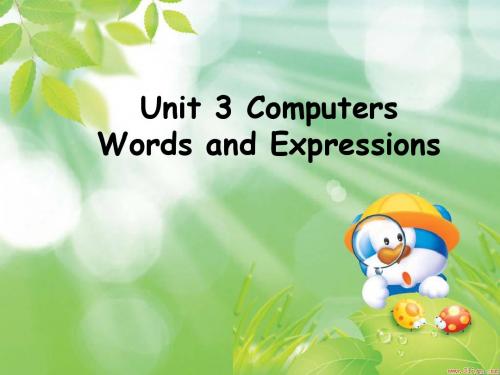
from then on as a result of so … that … share sth. with sb. as time goes by provide sb. with sth. be considered to be \ as be of high quality
Imitation Try to make sentences according to the given examples.
It will be 3 weeks before he comes back.
2. As time went by, I was made smaller and smaller. With time going by
As our life improves _____________________( 随着生活水平的 提高), we find more and more time entertaining. (as) With our life improving 随着生活水平的 _____________________( 提高), we find more and more time entertaining. (with)
Phrases
Find expressions for each of the following meanings from the reading passage.
since then because of
from then on
as a result of
so … that …
to such a great degree
to have or use sth. at the same time with sb. else with time going by to give sth. to sb. to think of sth.\sb. in a particular way Be good in quality all of the living human on the earth
- 1、下载文档前请自行甄别文档内容的完整性,平台不提供额外的编辑、内容补充、找答案等附加服务。
- 2、"仅部分预览"的文档,不可在线预览部分如存在完整性等问题,可反馈申请退款(可完整预览的文档不适用该条件!)。
- 3、如文档侵犯您的权益,请联系客服反馈,我们会尽快为您处理(人工客服工作时间:9:00-18:30)。
AI= artifical intelligence
artifical [ˌɑːtɪˈfɪʃl] adj. 人工的;人造的;假的;人为 的;非自然的;虚假的;假装的
intelligence [ ɪnˈtelɪdʒəns] n. 智力;才智;情报人员 记忆技巧:intel〔= inter 在…之 间〕+ lig 选择;收集 + ence 表 行为 → 知道如何选择 → 聪明
Part 03
Let's practice!
Match the words(词汇连线)
1) solve 2) explore 3) goal 4) signal 5) type 6) arise 7) electronic 8) anyhow 9) personal 10)calculate
1) n./vt .类型,打字 2 ) v. 发信号,信号 3) adv.无论如何,即使如 此 4) vt. 解决 5) vt. 计算 6) adj. 电子的 7) adj. 私人的,个人的 8) v.探索,探测,探究 9) vi. 出现,发生 10) n. 目标
Alan Turing
solve [sɒlv]
v. 解决;处理;解答;破解 ability to solve something 解决某事的能力 solve a crisis 化解危机 solve a mystery 破解迷局 solve a problem 解决问题 solve a puzzle 解答谜题 way to solve something 解决某事的方法
7)_e_xp_l_o_re_: to travel around the area to find out
about it
8) t_o_ta_ll_y__: completely
9)_a_n_yh_o_w_: anyway
10)_fi_n_a_nc_e_: activity of managing money
total [ˈtəʊtl]
adj. 总的;总计的;全体的; n. 总数;总额;合计;总计
I estimate that the total cost for treatment will be $12,500. totally adv. 完全地;整个地
so...that...如此...以致于...
happiness [ˈhæpinəs]
n. 幸福;愉快;(用语等的)适当; 幸运 happy happiness
human race
all people, considered together as a group n. 人类
download vt.下载
programmer n.程序员
virus [ˈvaɪrəs]
n. 类型;种类; v. (用计算机或打字机)打字;测 定…的类型;分型;定型 现在分词: typing 过去式: typed 过去分词: typed
in a way 在某种程度上
in the way:妨碍的
on the way:在途中/在路上;即将发生
in a way:在某种程度上
in this way:用这种方法/以这种方式/这样.
adj. 个人的;私人的;人际的;个性的;私
事的
记忆技巧:person 人 +
al …的→ 个人的
personally adv. 就个人而言;亲自
tube n.管子 transistor n.晶体管 chip n.芯片
as a result 结果
He worked hard at his study.As a result, he passed the exam easily.
A.So B. Anyhow C. Therefore D. Besides
4. -----Tom and Mary got married last month.
-----Are you kidding? They have ______ in common.
A. anything B. something C. nothing D. everything
explore一般指对未知事物或新生事物的探 索、观察与研究;
We must explore all the possibilities. He likes to explore the cave. One day, they explore a forest together.
goal [ɡəʊl]
n. 球门;射门;进球得分;目标; 目的
He continued to pursue his goal of becoming an actor. 目标 Liverpool won by three goals to one. 进球得分 He headed the ball into an open goal (= one that had nobody defending it) 球门
logical [ˈlɒdʒɪkl]
adj. 必然的;合乎情理的;合乎常理的; 符合逻辑的;按照逻辑的 派生词: logically adv. logic 逻辑(学)+ al …的 → 符合逻 辑的
technology [tekˈnɒlədʒi]
n. 科技;工艺;工程技术 复数: technologies 派生词: technological adj.
n. 病毒;(计算机程序中 的)病毒
coronavirus冠状病毒
signal [ˈsɪɡnəl]
n. 信号;暗号 v. 发信号;发暗号现在 分词: signalling 过 去式: signalled 过 去分词: signalled 记忆技巧:sign 信号 + al 表物 → 信号
type [taɪp]
technologically adv. 记忆技巧:techno 技艺,技术 + logy …学 → 技术(学)
revolution [ˌrevəˈluːʃn]
n. 革命;巨变;大变革;(环绕中心点的) 旋转;
复数: revolutions
记忆技巧:re 相反 + volu 卷,转 + tion 表名词 → 革命
ቤተ መጻሕፍቲ ባይዱ
Match the phrases(词组连线)
1) from...on 2) watch over 3) in common 4) after all 5) as a result 6) with the help
of 7) in a way
8) deal with
1) 毕竟
2) 处理;安排;对付 3) 结果 4)某种程度上 5) 在......帮助下 6) 看守;监视 7) 共有的;共同的 8) 从.......时起
根据释义写出单词
1)re_v_o_l_ut_io_n: complete change in ways of
thinking,working,etc
2) n_e_t_w_o_rk_: connected computer system
3) s_i_m_p_li_fy_: to make things easier
way
by the way 顺便问一下
across/ over the way 路对面, 街对面
a long way off 在远处, 离得远all the way 一路
上, 沿路 从远处, 特地 自始至终
electronic [ɪˌlekˈtrɒnɪk]
adj. 电子的;电子器件的;电子设备的
electronic calculator 电子计算器 electronic music 电子音乐 This dictionary is available in electronic form. 本词典有电子版。 an electronic engineer 电子工程师
Multiple Choice (单项填空)
1. He was very smart and ____the crossword in ten minutes.
A. dealt B. ended C. solved D. settled 2. If you want to _____the narrow alley(胡同) of old Beijing, you’d better use the pedicab (三轮车).
A. explore B. express C. exchange D. explode
Multiple Choice (单项填空)
3. I can’t tell you the exact time when I will get there,_____, Ill be there as early as I can.
The bag is so heavy that I can't carry it. The car is so expensive that I can't afford it. She was so angry that she couldn't speak
application [ˌæplɪˈkeɪʃn] n. 申请;请求;申请书;申请表;
words and expressions
必修二unit 3 Computers
目 录
CONTENTS
01 L i s te n a n d r e a d 02 L e t' s r e c og ni ze ! 03 L e t' s p r a cti ce! 04 Su m m a ry&h ome work
4) _ca_l_c_u_la_te: to find answer using numbers
5) _m_o_b_il_e_: able to be moved from place to
